
Perspectives Essay: The Upwards Spiral or the Long Descent?
Greater Manchester (GM) is not an island. The UK is experiencing the alarming consequences of unsustainable development. The skies are dark with pigeons coming home to roost. We are experiencing massive value destruction of economic and natural capital. It is through the lens of the principles of sustainable development that the question of GM progress is considered.
Manchester was the epicentre of the industrial revolution. More recently, GM has been at the forefront of English cities in attempting to construct a new model of governance. Over - confident claims and the strapline: “Manchester - original modern” are open to challenge, however.
There are excellent initiatives in the built environment, greening, energy, behaviour change and engagement. These include the Ecocities project, the development of MediaCityUK and of NOMA. But none of this joins up, adds up to a powerful, integrated drive towards a sustainable city region. There is no focal point that connects public policy, business, the academic communities and civil society in the pursuit of sustainable development. Diverse and disconnected policies, programmes, initiatives and projects do not add up to a concerted movement. We need an independent advocacy partnership.The critical success factors for this are outlined. What kind of future are we failing to design? Time is short. Original? Modern? Who will take the lead in the creation of Sustainability Greater Manchester?
The Triple Bottom Line
“Cloud 23 isn’t just any bar. Its location and ambience are unique. Floor to ceiling windows offer jaw-dropping view across a constantly changing cityscape” (1)
... and a Jereboam of Pommery Cuvee Louise Champagne will set you back £750. The bar on the 23rd floor of the Beetham Tower is the perfect conning tower from which to consider Greater Manchester (GM) - chutzpah, bling and unrivalled 360 degree views of the sprawling conurbation and the hills beyond. (FIG.1)
 Figure 1: View from Beetham Tower
Figure 1: View from Beetham Tower
Consider the question of the sustainable development of GM from the perspective of Cloud 23: Do GM politicians, officials, business leaders and citizens leaps out of bed in the morning with the war-cry “sustainable development now!”? No - growth is the zeitgeist, consumerism the culture, business as usual the norm and climate armageddon the inevitable destination.
This defeatist analysis makes no contribution to advancing the agenda. The narrative may be bleak but there are inspiring stories to be told. This personal perspective concludes with a positive proposal.
GM is not an island. The UK is experiencing the alarming consequences of unsustainable development. The skies are dark with pigeons coming home to roost. We are experiencing massive value destruction of economic and natural capital. Globally, the outcomes of Rio+20 have been irrelevant. Jonathon Porritt, as chair of the now defunct Sustainable Development Commission worked to help decision makers and opinion formers embed sustainable development as “the operating system of choice”. On Rio+20: “First they killed the SDC. Now they are trying to kill off sustainable development itself...even I did not think that The Coalition Government could sink this far” (2).
In Whitehall, “Functional economic areas” is the narrow construct of cities and city regions underlining a total lack of vision beyond that of economics. However, Sustainable Development Commission legacies include formal recognition of its principles (FIG.2)(3) in, for example the National Planning Policy Framework 2012 (4). The principles are:
- Environmental limits
- Strong healthy and just society
- Sustainable economy
- Using sound science responsibly
- Promoting good governance.
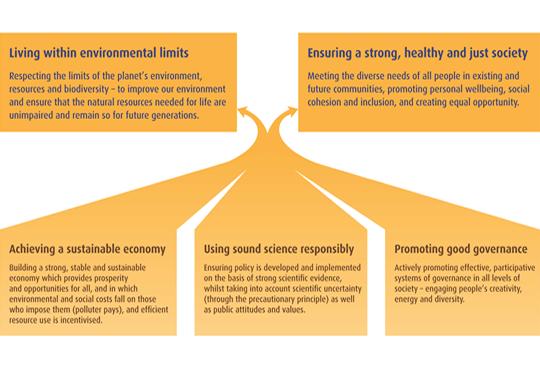
Figure 2: The Principles of Sustainable Development
Elkington’s “triple bottom line” (5) remains a helpful riposte to those who whine that the concept of sustainable development is too complex, too boring or simply defeats them (FIG 3).
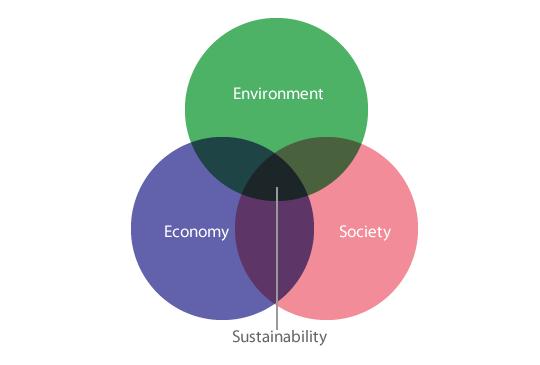
Figure 3: The Triple Bottom Line
It is through the lens of the principles, focused on the triple bottom line, that the question of GM progress can be considered.
Greater? Manchester - Work in Progress
“And on the eight day, God created Manchester” - The Stone Roses (6)
Manchester was the epicentre of the industrial revolution and its extraordinary Victorian urban development has been well documented (7). Its place in World history is assured. Civilisations and cities decline and fall. Manchester has been no exception. Its twentieth century decline and shrinking reflected global and national economic trends.
"What kind of future are we failing to design? Time is short. Original? Modern? Who will take the lead in the creation of Sustainability Greater Manchester?"
Its twenty first century regeneration has been in spite of the dysfunctional, metrocentric state of British governance. Mrs. Thatcher abolished Greater Manchester Council, and with it - city region governance. This has disadvantaged the city in comparison with similar European provincial cities with far greater devolved powers and coherent municipal leadership. It has impeded the possibility of joined-up systems approaches to planning and delivery: GM has ten local authorities. In his 2011 provocation to Liverpool - “Rebalancing Britain - policy or slogan?”, former Thatcher Minister Heseltine:
“The government should undertake a a major devolution of responsibility to local government to encourage diversity of administration, distribute capital allocations by competition, reward success and concentrate itself on the spread of best practice. In a sentence, the government should re-create local government” (8).
This is work in progress. GM has been at the forefront of English cities in attempting to construct a new model of joined up governance - The Greater Manchester Combined Authority (9). The destruction of the Northwest regional machinery, while welcomed by many GM politicians, has left gaps. IPPR’s Northern Futures Commission has posed fundamental questions about city region governance, pan-northern connections and leadership (10).
In sharp contrast to some of the peripheral authorities, Manchester City Council has benefited from exceptionally strong and consistent municipal leadership. Its recent track record of rebuilding the city centre has been widely acclaimed and there is genuine cause for pride. Between 2001 - 2011 its population grew by 19%, ahead of any other local authority outside London (11).
Over - confident claims and the strapline: “Manchester - original modern” are open to challenge, however, from a sustainability perspective. Forum for the Future’s annual Sustainable Cities Index (12) tracked progress in Britain’s largest 20 cities - highlighting their environmental performance, quality of life and readiness for the challenges of the future. In 2010, Manchester ranked a mediocre 13th with the commentary rightly recognising its success in urban regeneration but pointing out serious failures such as air quality and life expectancy. The Association of Greater Manchester Authorities (AGMA) Health Commission notes that GM has some of the worst life expectancy and health outcomes in the country (13).
Manchester’s pioneering “Mini-Stern” report as early as 2008 confirmed the city’s strengths but warned that the costs of inaction on climate change could be the loss of £20bn GVA over the period 2012-20 within its “failure to adapt” scenario (14).
There remain immense challenges in critical infrastructure. The Manchester University / Bruntwood “Ecocities” initiative (15) points out that 80% of electricity substations, water storage and treatment plants, waste management sites and landfills are located in areas prone to surface water flooding. The areas at risk of surface water flooding coincide spatially with areas of deprivation.
At the domestic level, despite attempts at retrofitting initiatives, a shocking 42% of cavity walls in Salford housing, for instance, remain uninsulated (16).
Generalisations about the private sector and sustainability are of no value. There are distinguished examples of enlightened action. At the other end of the spectrum, ENWORKS has noted a decreasing uptake by GM SMEs of the most basic resource efficiency measures - even those with very rapid return on investment (17). SME’s in the current climate tend to be pre-occupied by issues of working capital and decreasing management capacity.
Citizens have choices. Carbon Footprint analysis (18) illustrates the stark reality that no less than 11% of GM CO2 emissions are generated by personal leisure flights (FIG. 4). The resounding vote against congestion charging in 2008 did not suggest that sustainability was high on individual agendas (19).
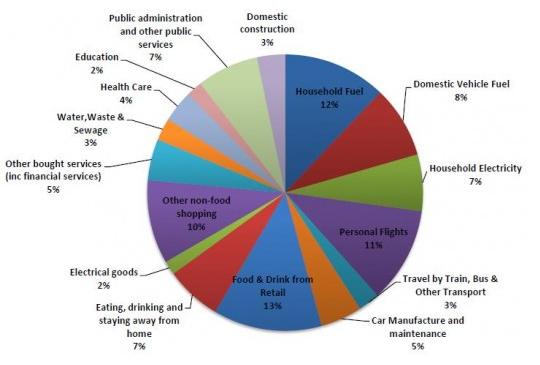
Figure 4: GM CO2 Emissions
In the light of the evidence, it is just not credible to claim that Manchester compares well with cities heading along the rocky path towards a more sustainable future. Can this be the result of sustainability illiteracy?
Susrainability Literacy in Greater Manchester
“Words-action = shit” - elegantly lettered notice in the office of a Manchester “key player” (20)
There are many references to sustainability in GM policies. The GM Strategy (21) asserts that:
“We will be known for our good quality of life, our low carbon economy and our commitment to sustainable development” (my boldface).
The GM Climate Change Strategy (22) has the excellent strapline: “ Transformation, adaptation and competitive advantage”.
On the GM policy agenda are:
- Climate change
- The green / low carbon economy
- Innovation
- Carbon literacy
Off the policy agenda is informed debate about aviation, for instance. Manchester Airport - owned by the local authorities - has been brilliantly successful in arguing its economic contribution. What is less often underlined is that only 18% of its trade is business. Now it aspires to “Airport City” (23) - massive out of town greenfield office development of the kind that is ubiquitous across the world.
Planning is a way of integrating and mediating conflicting needs, aspirations and shaping sustainable development. Professional planning is being downgraded within the GM local authorities. Capacity is decreasing. The process of “economic development” continues to be in the ascendant in terms of positioning and influence. The inevitable consequence is that it is more difficult to shape coherent, connected, systems based approaches. Great play is made of the importance of evidence based policy making. Economic “evidence” on its own, however, is often questionable and always inadequate. Sustainability literacy by definition embraces social and environmental as well as economic comprehension and connections.
Manchester’s strong academic sector plays a helpful, provocative role. Centres of excellence such as SURF, CURE and Tyndall are assets.The third sector, intermediaries and partnerships have contributed with initiatives such as “Manchester is my Planet” (24).
In GM there worthy and occasionally excellent initiatives in the built environment, greening, energy, behavior change and engagement. But none of this joins up, adds up to a powerful, integrated drive towards a sustainable city region.
Upward Spiral or Long Descent? - The Challenges
“I think that the odds are no better than 50% that out present civilisation will survive to the end of the present century” - Martin Rees (25)
The Ecocities project outlined future climate change scenarios for GM 2050. Its compelling strapline is: “upward spiral or long descent?” How does a city adapt to 4 degrees of climate change? This is a huge challenge - and there is far more to resolve than adapting to climate change. The future will be shaped by turnt forces largely outside the control of the city region, whatever its governance. David King’s “Circle of Doom” (26) (FIG 5) neatly summarises these.
Through the lens of sustainable development principles:
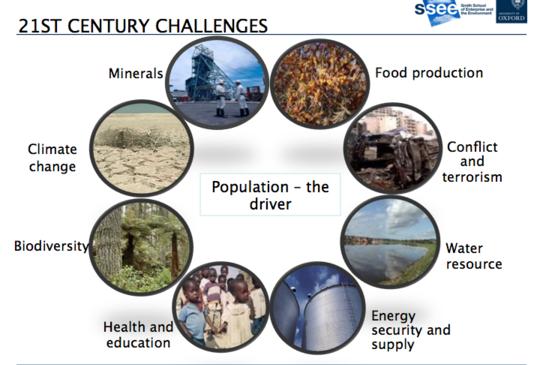
Figure 5: Circle of Doom
- Environmental limits:
How do we reduce the carbon footprint of GM against consumer desires and trends and the retrogressive mantra of growth at any price?
- Strong healthy and just society?:
How can the gross inefficiencies and injustices of increasing inequality be resolved?
- Sustainable economy:
How can the GM economy be retuned to make it fit for a very different future reversing the acceptance of business as usual, the old economy and delusions about returning to a pre-austerity golden age?
- Using sound science responsibly:
How do we change the fixation with what is claimed as “evidence” in policy making - “economic data” - to connect with sustainability research, intelligence and science?
- Promoting good governance:
How can GMCA be strengthened in the direction of powerful city region governance and leadership for sustainable development against the metrocentric domination of London and the south east?
The sustainability agenda for GM needs to be redirected from the dangers of “long decline” towards at least the possibility of “upward spiral”.
From Rhetoric to Reality
“When you have to choose between truth and legend, I say choose the legend” - Anthony H Wilson (27)
There are isolated and unconnected examples of excellence and inspiration. Here are three. Significantly, one is led by the academic sector, one by the private sector and and one by the mutual / co-operative sector.
ECOCITIES (Fig 6)
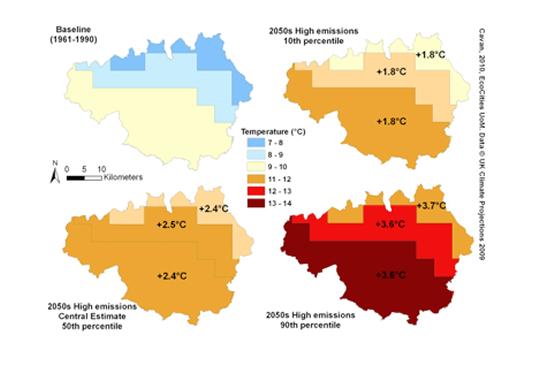
Figure 6: EcoCities
EcoCities (28) is an initiative led by the University of Manchester and funded by Bruntwood, drawing on the expertise of the Manchester Architecture Research Centre (MARC) and Centre for Urban Regional Ecology (CURE). The project is focused on the response of urban areas to the impacts of climate change, looking particularly at adaptation.
EcoCities provides Greater Manchester with its first blueprint for an integrated climate change adaptation strategy. Based on leading scientific research, extensive stakeholder engagement, and best practice examples of new programmes successfully piloted during a three-year period, Four Degrees of Preparation was launched at the Adapting the City conference in May 2012.
Eco-cities was financed by Manchester-based property company Bruntwood - a leader in the business community in GM, committed to the sustainability agenda and actively engaged with thought leadership in the city region. Significantly, Bruntwood is a privately owned company, with an expanding geographical reach but remains headquartered in Manchester.
MEDIACITYUK (FIG.7)
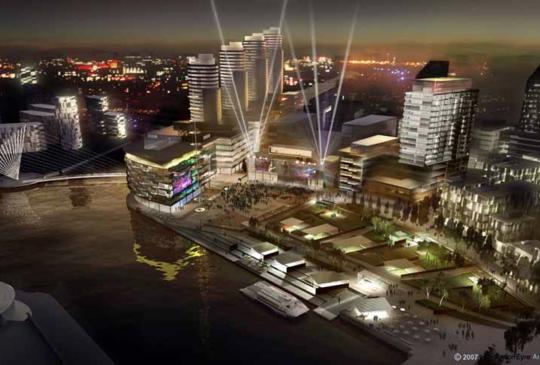
Figure 7: MediaCityUK
MediaCityUK (29) is a major brownfield development on land adjacent to The Manchester Ship Canal adjacent to Salford Quays. It is a mixed-use development anchored around the BBC.
It was the first scheme in the world to become a BREEAM approved sustainable community, by incorporating state of the art sustainability factors into the design.
Phase One of MediaCityUK was designed to meet the BREEAM criteria, using the valuable asset of water from the Manchester Ship Canal to power, heat and cool the buildings across the 36-acre site. Several of the buildings including the Holiday Inn and The Studios use a combined heat and power plant energy system known as Tri-Gen, centralising heating and cooling equipment. The benefits include substantial reductions in C02 emissions. The water is returned to The Canal cleaner than it was before.
During construction, the ship canal was used to transport materials, reducing the amount of emission heavy motorway journeys by lorry. Residents, occupiers and visitors travelling to MediaCityUK are actively encouraged to use public transport, (including the new Metrolink service). 300 cycle bays have been installed at points across the site.
MediaCityUK is an initiative of Northwest developer Peel, again a private company, with wide geographical reach but still headquartered in the region.
Stereotypical accusations of short-termism driven by the vagaries of investors, financiers, the City of London cannot be made against Bruntwood or Peel, both with track records of playing the long game.
NOMA (FIG.8)
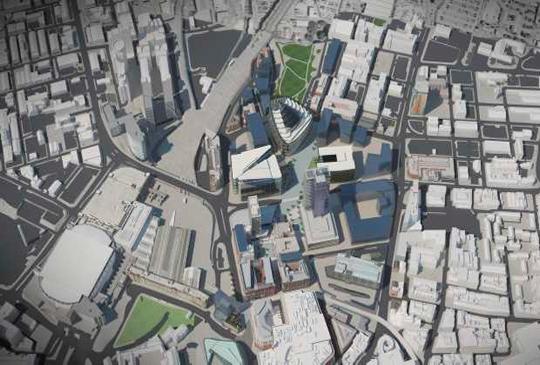
Figure 8: NOMA
NOMA (30) is under construction, a new, 4 million sq ft, mixed-use, masterplanned redevelopment in the heart of Manchester: offices, shops, hotels and homes.
Backed by the powerful Manchester headquartered Co-operative Group, NOMA aims to transform 20 acres of Manchester city centre with the distinctive values and principles of the co-operative movement.
NOMA will generate all of its own power, with a renewable energy centre providing for all of its needs through a smart grid. It will be integrated into the existing transport network, with tram, rail, bus and road connections immediately adjacent to the site.
By respecting the Group's own heritage buildings and the industrial legacy of Arkwright's historic mill and the history of the site, NOMA aspires to become a reminder of the city's position in global innovation. The commitment that the Group has shown to promoting apprenticeships, skills and training through its new head office build programme is to be continued through the development of the whole Masterplan.
Noma exemplifies the pioneering stance of The Co-operative Group in mainstreaming sustainability into its many businesses. The Group is active in campaigning and lobbying for radical change in some unexpected zones from tar-sands in Canada to shark eggs worldwide.
Its mutual status enables the Co-operative to act in ways that could not be expected of a stock market listed company constrained by short-termism and superficial notions of “corporate responsibility”.
The "Manchester Family"
A tricky question posed by the SURF MISTRA GM platform is - who is included in addressing the challenges of sustainability in GM? A simplistic answer in terms of public policy is of course the emerging Greater Manchester Combined Authority and the constellation of arrangements that comprise “The Manchester Family” (31) (FIG. 9).
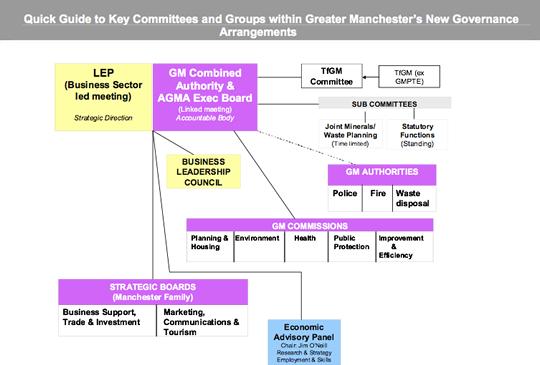
Figure 9: "The Manchester Family"
With the exception of London with its mayoral regime, institutions and powers, Manchester is more advanced in its structures than any other English city region - this is acknowledged by government and all informed commentators. In July 2012, the Government’s “city deal” devolved further powers and flexibility in resource allocation to Manchester and other provincial cities (32).
Manchester has an outstanding record in co-opting and corralling new government initiatives such as the LEP with a view to ensuring a coherent position in lobbying for resources. However, as a recent LEP Family Performance Report (33) reveals, sustainable development is not a mainstream concern.
There is no focal point that connects public policy, business, the academic communities and civil society in the pursuit of sustainable development. Diverse and disconnected policies, programmes, initiatives and projects do not add up to a concerted movement.
Sustainability Greater Manchester
“Birmingham - that’s a suburb of London isn’t it” - Terry Christian (34)
Manchester “boosterism” can be a great strength. From its place at the epicentre of the world’s first industrial revolution, through decline into a new era of “original modern” - radicalism, innovation and competitiveness have been a hallmark of the city. The idea of sustainable development is no exception:
“We will be known for...and our commitment to sustainable development” - GM Strategy (35).
The concept of a “living laboratory”, floated by Manchester University’s Dame Nancy Rothwell at the launch of Bruntwood Eco-cities is the germ of a powerful idea. It chimes with the notion endlessly discussed by the tiny, sustainable development sect or “community” in the city that we reinvigorate an independent sustainable development advocacy body.
Many lessons have been learned from the ill-fated Sustainability Northwest (SNW). SNW in its early years successfully boosted the Northwest as the English region that led the way that others were to follow - not only the English regions but also the UK’s devolved administrations. Sustainability Northwest In its early years pushed the boundaries of agendas. It enabled the Northwest region to lead the country in exploring climate change a decade before this became a mainstream item. It led debate around “smart development”. It ensured that environmental technologies were recognised as a growth area years before this became conventional wisdom. It stimulated and captured thought leadership, engaged decision makers in all sectors and at every level - local, regional and national.
This unique partnership failed not because it had outlived its usefulness but as a result of inadequate leadership and poor management.
Now we look with envy at the contribution to their cities made by London Sustainability Exchange, Malmo Institute for Sustainable Urban Development in Sweden, Wuppertal Institute for Climate Environment and Energy and other bodies firmly embedded in their city regions.
Regions are dead for the moment in England and so any attempt to reinvent a regional sustainable development advocacy body would fail. But a GM city region sustainable development partnership could go with the flow of boosterism and the emerging city region structures. Just as Todomorden has invented vegetable tourism, so GM could invent sustainability tourism.
We have immense experience of independent, cross sectoral partnership models - their failings, successes and the critical success factors that make them sing. The critical success factors for Sustainability Greater Manchester (SGM) are:
LEADERSHIP
Leadership emerges in many different places – in community groups, in politics, at the head of powerful public and private sector organisations. Some leaders are elected. Others are appointed or self-appointed. Successful partnerships need strong leadership.
VISION
The vision must be crystal clear and mission drift rejected. Visions must be concise - capable of passing the elevator pitch test. The Northwest region has generated more public sector visions than Mother Theresa. Now they are forgotten.
INDEPENDENCE
Gaining the confidence of all sectors - private, public, academic, third and community - necessitates independence from any of them. The agenda is far too important to be captured by any one vested interest at the risk of losing the others.
TIMESCALE
Ecological time, community time, economic and political timescales are never synchronised. Short-term, quick fix political initiatives come and go and are soon forgotten. Transformational change takes time. Immediate action must be in the context of long term thinking.
GOVERNMENT BACKING
England is a metrocentric nation in which government and Whitehall retain power and cannot be sidelined. GM has frequently demonstrated the advantages of Government backing for new, strategic “pilots” and initiatives.
RESOURCES
Even in this age of austerity we remain one of the richest countries in the world. Choices about the investment of public sector resources have immense potential to “rebalance the economy” away from the gridlocked, unsustainable dystopia that is London and the southeast. The private and academic sectors too have ways of supporting innovation.1+1+1= 4.
STRATEGY AND DELIVERY
Strategy and delivery must be connected. One without the other is dangerously fragile and undermines credibility. Action is needed at every spatial level - globally, at the level of The European Union, nationally, within GM as a geography and in local neighbourhoods, with local communities.
WAYS OF WORKING
Aspiring to lead transformational change and to exercise influence far beyond any “mandate”means working by:
- Influencing opinion and priorities among stakeholders, politicians, government officials, the business community and local people
- Enabling projects to be delivered with many partners
- Enhancing the work of partners by raising their aspirations towards higher quality outcomes
- Communicating and interacting appropriately with different audiences.
STRUCTURES
People are more important than organisational structures. Progress is more important than process. Positive change on the ground is more important than strategy. Debates about structures and representation must not be allowed to crush ambition. Despite constipated systems and the dangers of strangulation by structures, process and targets, exceptional people can achieve remarkable things.
COMMUNICATIONS
It is not enough to be correct, worthy, dull and sidelined like much of the environmental movement. We live and work in an instantaneous communications ecosystem of many voices and many media. Engaging communications must be at the very heart of the sustainable development mission.
PARTNERSHIP
Partnership has become an aerosol word – sprayed on everything, often signifying nothing. Aiming for the highest common factor rather than the lowest common denominator is far from easy in partnership working. Mistrust and misunderstandings between the sectors - public, private, third, academic - are serious barriers to progress. By attacking stereotypes, breaking down barriers and creating new alliances, more is achieved with less. There is no credible alternative.
We understand the difference between lowest common denominator and highest common factor. By 2050, a child born today in GM will have reached the age of 38. What kind of future are we failing to design? Time is short. Original? Modern? Who will take the lead in the creation of Sustainability Greater Manchester?
References
1 - www.cloud23bar.com
2 - www.jonathonporritt.com/blog/sd-rip
3 - www.sd-commission.org.uk/pages/the_principles
4 - www.communities.gov.uk/publications/planningandbuilding/nppfl
5 - www.en.wikipedia.org/wiki/Triple_bottom_line
6 - www.pocketessentials.com/music/1903047803madchesterscene/ai.php
7 - Hunt, Tristram: Building Jerusalem, London 2004
8 - www.bis.gov.uk/.../11-1338-rebalancing-britain-liverpool-city-regio...
9 - www.agma.gov.uk
10 - www.ippr.org/research-projects/44/7405/northern-economic-futures- commission? siteid=ipprnorth
11 - www.ons.gov.uk/ons/rel/mro/news-release/census-result-shows-increase-in- population-of-the-north-west/censusnorthwestnr0712.html
12 - www.forumforthefuture.org/project/sustainable-cities-index/overview
13 - www.greatermanchesterhealth.org.uk/
14 - www.greenbang.com/mini-stern-for-manchester_5445.html
15 - www.adaptingmanchester.co.uk/
16 - Reported at GM Climate Change Strategy workshop, Salford 2011
17 - Reported by Todd Holden of ENWORKS, EcoCities launch Manchester, May 14 2012
18 - www.manchesterclimate.com/node/3709
19 - www.news.bbc.co.uk/1/hi/england/manchester/7778110.stm
20 - Observed by the author, June 2012
21 - www.agma.gov.uk/agma/greater_manchester_strategy/index.html
22 - www.manchesterclimate.com/node/804
23 - www.airportcity.co.uk/sustainability/regions-future/
24 - www.manchesterismyplanet.com/
25 - www.ted.com/talks/martin_rees_asks_is_this_our_final_century.html
26 - David King - presentation to Mersey Basin Campaign final Conference, September 27 2009
27 - 24 Hour Party People 2002
28 - EcoCities ibid
29 - www.mediacityuk.co.uk/our-community/sustainability
30 - www.noma53.com/
31 - www.investinmanchester.com/news/changes-to-the-manchester-family-of- organisations-announced/
32 - www.guardian.co.uk/society/2012/jul/05/city-deals-eight-cities-greater-control
33 - www.manchester.gov.uk/egov.../6_Local_Enterprise_Partnership.pdf
34 - Apocryphal?
35 - www.agma.gov.uk/agma/greater_manchester_strategy/index.html
This Perspectives Essay was written as part of the Greater Manchester Local Interaction Platform's (GM LIP) 'Mapping the Urban Knowledge Arena' project. The GMLIP is one of five global platforms of Mistra Urban Futures, a centre committed to more sustainable urban pathways in cities. All views belong to the author/s alone.
Contributor Profile
Walter Menzies was an independent advisor on sustainable development and partnership development and management with the public, private and third sectors. He was chair of the Manchester and Pennine Waterway Partnership (of the Canal and Rivers Trust) providing leadership, championing and developing a strategic plan for Manchester and Pennine area, provisionally titled: “Manchester - Capital of the North’s Waterways?”.

